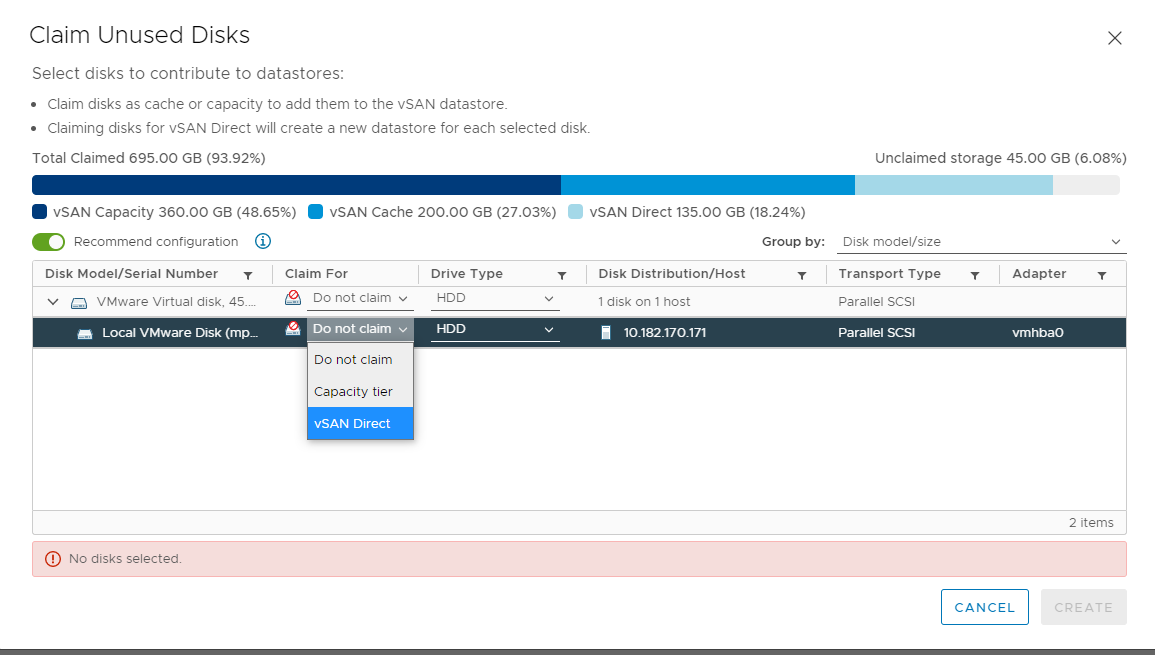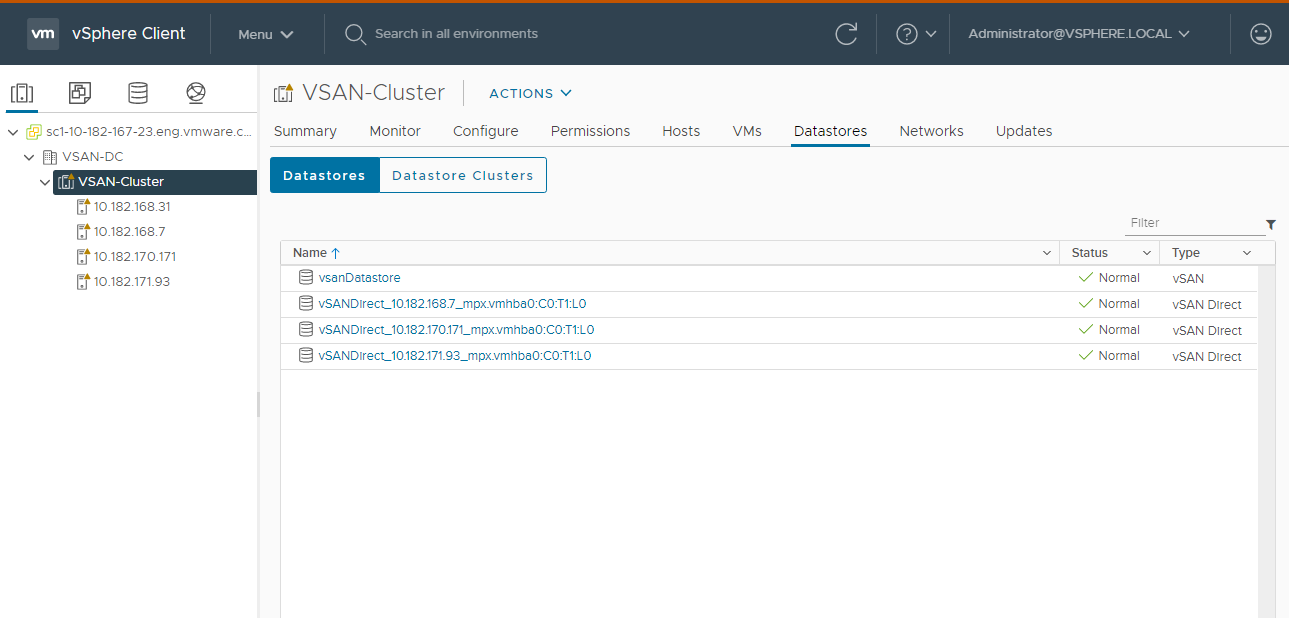如果要為 vSphere IaaS control plane 中可設定狀態的服務建立專用硬體叢集,則可以使用 vSAN Direct 資料存放區。vSAN Direct 是一個以原始資料為主的資料存放區,部署在 ESXi 主機本機未宣告的儲存裝置上。
為 vSAN Direct 標記儲存裝置
vSAN Direct 需要 vSAN 叢集中每個 ESXi 主機上的一些未宣告磁碟。但是,在某些環境中,vSAN 會自動宣告主機上的所有本機儲存裝置。可以使裝置不符合一般 vSAN 的資格而可用於 vSAN Direct。
程序
使用指令碼將儲存裝置標記用於 vSAN Direct
或者,也可以使用以下指令碼標記連結到 ESXi 主機的 HDD 裝置。執行指令碼後,裝置將不符合一般 vSAN 的資格而可用於 vSAN Direct。
#!/usr/bin/env python3
# Copyright 2020 VMware, Inc. All rights reserved.
# Abstract
#
# This script helps manage tagging of Direct Attached HDD disks
# on ESXi systems for vSAN Direct in preparation for a VCF deployment.
#
# It is expected to be used with ESX systems of version 7.0.1 or later.
#
import argparse
from enum import Enum
import logging
import sys
import os
import paramiko
import subprocess
import traceback
import ast
import getpass
from six.moves import input
from distutils.util import strtobool
from argparse import ArgumentParser
class ParseState(Enum):
OPEN = 0
DEVICE = 1
class RemoteOperationError(Exception):
pass
class EsxVersion:
def __init__(self, major, minor, release):
self.major = major
self.minor = minor
self.release = release
def __str__(self):
return '{}.{}.{}'.format(self.major, self.minor, self.release)
@staticmethod
def build(str):
tokens = str.split(b'.',3)
return EsxVersion(int(tokens[0]), int(tokens[1]), int(tokens[2]))
class StorageDevice:
def __init__(self, deviceId, isSSD, isVsanDirectEnabled):
self.deviceId = str(deviceId.decode())
self.isSSD = isSSD
self.isVsanDirectCapable = True
self.isVsanDirectEnabled = isVsanDirectEnabled
def __str__(self):
return '{}:\n\tIs SSD: {}\n\tvsanDirect enabled:{}'.format(
self.deviceId,
self.isSSD,
self.isVsanDirectEnabled)
@staticmethod
def strToBool(v):
return bool(strtobool(str(v.decode())))
@staticmethod
def build(deviceId, props):
vsanDirectEnabled = False
isLocal = StorageDevice.strToBool(props[b'Is Local'])
status = props[b'Status']
isOffline = StorageDevice.strToBool(props[b'Is Offline'])
isSSD = StorageDevice.strToBool(props[b'Is SSD'])
isBootDevice = StorageDevice.strToBool(props[b'Is Boot Device'])
deviceType = props[b'Device Type']
if deviceType == b'Direct-Access' and isLocal and (not isOffline) and (not isBootDevice) and status == b'on':
return StorageDevice(deviceId, isSSD, vsanDirectEnabled)
else:
print("Skipping device {}".format(deviceId))
return None
def parse_arguments():
"""
Parses the command line arguments to the function
"""
parser = argparse.ArgumentParser()
parser.add_argument('--hostname', dest='hostname',
help='specify hostname for the ESX Server', required=True)
parser.add_argument('--username', dest='username',
help='specify username to connect to the ESX Server', required=True)
parser.add_argument('--password', dest='password',
help='specify password to connect to the ESX Server', required=False)
return parser.parse_args()
def get_esx_version(sshClient):
global logger
stdin_, stdout_, stderr_ = sshClient.exec_command('vmware -v')
exit_status = stdout_.channel.recv_exit_status()
if exit_status != 0:
logger.error('Command exited with non-zero status: %s' % exit_status)
logger.error('Error message: %s' % stderr_.read())
raise RemoteOperationError('Failed to determine ESX version')
output = stdout_.read()
tokens = output.split()
if len(tokens) < 3:
raise RemoteOperationError('Invalid ESX Version - %s', output)
return EsxVersion.build(tokens[2])
def check_esx_version(esxVersion):
return esxVersion.major >= 7 and esxVersion.minor >= 0 and esxVersion.release >= 1
def query_devices(sshClient):
global logger
stdin_, stdout_, stderr_ = sshClient.exec_command('esxcli storage core device list')
exit_status = stdout_.channel.recv_exit_status()
if exit_status != 0:
logger.error('Command exited with non-zero status: %s' % exit_status)
logger.error('Error message: %s' % stderr_.read())
raise RemoteOperationError('Failed to query core storage device list')
output = stdout_.read()
# Build the device list from the output
return create_device_list(output)
def create_device_list(str):
devices = []
deviceId=""
deviceProps={}
parseState = ParseState.OPEN
for line in str.splitlines():
if parseState == ParseState.OPEN:
if line.strip():
deviceId=line.strip()
parseState = ParseState.DEVICE
elif parseState == ParseState.DEVICE:
if line.strip():
props = line.strip().split(b':',1)
deviceProps[props[0]] = props[1].strip()
else:
if deviceId:
device = StorageDevice.build(deviceId, deviceProps)
if device:
devices.append(device)
else:
logger.debug("Skipping device {}".format(deviceId))
deviceId=""
deviceProps={}
parseState = ParseState.OPEN
if deviceId:
device = StorageDevice.build(deviceId, deviceProps)
if device:
devices.append(device)
return devices
def tag_device_for_vsan_direct(sshClient, deviceId):
global logger
logger.info("Tagging device [{}] for vSAN Direct".format(deviceId))
command = "esxcli vsan storage tag add -d " + deviceId + " -t vsanDirect"
stdin_, stdout_, stderr_ = sshClient.exec_command(command)
exit_status = stdout_.channel.recv_exit_status()
if exit_status != 0:
logger.error('Command exited with non-zero status: %s' % exit_status)
logger.error('Error message: %s' % stderr_.read())
raise RemoteOperationError('Failed to tag device [{}] for vSAN Direct'.format(deviceId))
logger.info('Successfully tagged device [{}] for vSAN Direct'.format(deviceId))
def untag_device_for_vsan_direct(sshClient, deviceId):
global logger
logger.info("Untagging device [{}] for vSAN Direct".format(deviceId))
command = "esxcli vsan storage tag remove -d " + deviceId + " -t vsanDirect"
stdin_, stdout_, stderr_ = sshClient.exec_command(command)
exit_status = stdout_.channel.recv_exit_status()
if exit_status != 0:
logger.error('Command exited with non-zero status: %s' % exit_status)
logger.error('Error message: %s' % stderr_.read())
raise RemoteOperationError('Failed to untag device [{}] for vSAN Direct'.format(deviceId))
logger.info('Successfully untagged device [{}] for vSAN Direct'.format(deviceId))
def get_vsan_info_for_device(sshClient, deviceId):
global logger
command = "vdq -q -d {}".format(deviceId)
stdin_, stdout_, stderr_ = sshClient.exec_command(command)
exit_status = stdout_.channel.recv_exit_status()
if exit_status != 0:
logger.error('Command exited with non-zero status: %s' % exit_status)
logger.error('Error message: %s' % stderr_.read())
raise RemoteOperationError('Failed to query vsan direct status on device [%s]' % deviceId)
output = stdout_.read()
return ast.literal_eval(str(output.decode()))
def update_vsan_direct_status(sshClient, devices):
for device in devices:
vsanInfo = get_vsan_info_for_device(sshClient, device.deviceId)
device.isVsanDirectEnabled = vsanInfo[0]['IsVsanDirectDisk'].strip() == "1"
device.isVsanDirectCapable = vsanInfo[0]['State'].strip() == 'Eligible for use by VSAN'
def getVsanDirectCapableDevices(devices):
selectDevices = []
# Cull devices incapable of vSAN Direct
for device in devices:
if device.isVsanDirectCapable:
selectDevices.append(device)
return selectDevices
def print_devices(devices):
print("Direct-Attach Devices:")
print("======================")
iDevice = 0
for device in devices:
iDevice = iDevice + 1
print ("{}. {}".format(iDevice, device))
print("======================")
def tag_devices(sshClient, devices):
for device in devices:
tag_device_for_vsan_direct(sshClient, device.deviceId)
def untag_devices(sshClient, devices):
for device in devices:
untag_device_for_vsan_direct(sshClient, device.deviceId)
def tag_all_hdd_devices(sshClient, devices):
hddDevices = []
for device in devices:
if not device.isSSD:
hddDevices.append(device)
if len(hddDevices) > 0:
tag_devices(sshClient, hddDevices)
def show_usage():
print ("===================================")
print ("commands: {tag-all-hdd, tag, untag}")
print ("\ttag <comma separated serial numbers of devices>")
print ("\tuntag <comma separated serial numbers of devices>")
print ("\ttag-all-hdd")
print ("=============")
def main():
global logger
logger.info('Tag disks for vSAN Direct')
try:
# Parse arguments
args = parse_arguments()
# 1. Setup SSH connection to ESX system
sshClient = paramiko.SSHClient()
sshClient.load_system_host_keys()
sshClient.set_missing_host_key_policy(paramiko.AutoAddPolicy())
passwd = args.password
if passwd == None:
passwd = getpass.getpass(prompt='Password: ')
logger.info('Connecting to ESX System (IP: %s)' % args.hostname)
sshClient.connect(args.hostname, username=args.username, password=passwd)
# version check
esxVersion = get_esx_version(sshClient)
print('ESX Version on {} is {}'.format(args.hostname, esxVersion))
logger.info('Checking ESX Version...')
if not check_esx_version(esxVersion):
raise Exception('ESX Version must be 7.0.1 or greater')
print ('This script helps tag direct-attached disks for vSAN Direct on ESX')
print ('Note: Only disks of type HDD are supported at this time.')
print ()
print ("For help, type help")
show_usage()
while True:
# get device list
print("Querying devices...")
devices = query_devices(sshClient)
# update devices with vSAN Direct status
update_vsan_direct_status(sshClient, devices)
# cull device list
selectDevices = getVsanDirectCapableDevices(devices)
# List the devices for the user to see
print_devices(selectDevices)
# find out what the user wants to do to these devices
args = input('Command> ').split()
if len(args) == 0:
break
cmd = args[0]
if cmd == 'q' or cmd == 'quit' or cmd == 'exit':
break
elif cmd == 'help':
show_usage()
elif cmd == 'tag-all-hdd':
print("Tagging all HDD devices...")
tag_all_hdd_devices(sshClient, selectDevices)
elif cmd == 'tag' or cmd == 'untag':
chosenDevices = []
if len(args) > 1:
serials = args[1].split(',')
for serialStr in serials:
serial = int(serialStr)
if serial < 1 or serial > len(selectDevices):
raise Exception("Error: Serial {} is out of range".format(serial))
chosenDevices.append(selectDevices[serial-1])
if len(chosenDevices) == 0:
print("No devices specified")
continue
if cmd == 'tag':
print("Tagging devices...")
tag_devices(sshClient, chosenDevices)
else:
print("Untagging devices...")
untag_devices(sshClient, chosenDevices)
else:
print ("Error: Unrecognized command - %s" % cmd)
except paramiko.ssh_exception.AuthenticationException as e:
logger.error(e)
sys.exit(5)
except Exception as e:
logger.error('Disk tagging failed with error: %s' % e)
logger.error(traceback.format_exc())
sys.exit(1)
finally:
# Close SSH client
try:
sshClient.close()
except:
pass
# Set up logging
logging.basicConfig()
logger = logging.getLogger('tag-disks-for-vsan-direct')
if __name__ == "__main__":
main()
建立 vSAN Direct 資料存放區
身為 vSphere 管理員,可以設定要用於 vSAN 資料持續性 平台或虛擬機器執行個體儲存區等功能的 vSAN Direct 資料存放區。若要建立資料存放區,請使用 ESXi 主機本機的未宣告儲存裝置。

